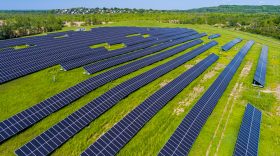A recent cross-national survey found that while consumers were optimistic about the future of solar, understanding of cost and adoption rates was limited.
Applied Materials, a firm that produces PV manufacturing equipment, commissioned Ketchum and Ipsos to conduct its fourth annual solar energy survey. The Summer Solstice 2012 survey results were released on June 18.
The survey was conducted in China, India, Japan and the United States – with 1,000 participants from each country – and found consumers in these countries to be optimistic about the future of solar power. However, there were variations in the perceived cost of solar energy.
Across the four countries, 55 percent of respondents believed that solar power is less expensive than traditional energy sources. In India, 68 percent thought solar power was less expensive, while 51 percent of Japanese respondents thought solar power was more expensive.
“Solar panels now cost less than $1 per watt, which means more than 100 countries have achieved grid parity,” said Dr. Charlie Gay, president of Applied Materials’ Solar division.
“We have witnessed an explosion in global solar PV installations in the past year due to the dramatic and accelerated rate of cost reductions in the supply chain. This has resulted in significant decreases in end-market costs, and a continued focus on technology innovation will further drive down the total cost of solar electric power plants.”
Further, almost half of those surveyed thought the solar market would lead to job opportunities, while one quarter believed that growth in the solar industry would reduce the number of jobs.
“More than fifty percent of the jobs in the global solar power industry are found after the solar panel leaves the factory, such as construction teams, installers, sales people, designers, engineers, electricians, etc.,” said Cathy Boone, senior director for Energy Policy and Market Development at Applied Materials.
“Any country, city or community has the potential to directly benefit from the growth in the solar power industry with on-the-ground jobs if they are willing to make a commitment to replacing fossil fuels with solar.”
Over half of respondents in both China and India found the current rate of solar energy adoption in their respective countries to be too slow. According to Applied Materials, this response indicates that people realize that solar power can play a major role in a nation’s energy supply.
Despite the positive view of solar energy, respondents were not knowledgeable about the current state of solar. Survey participants were most likely to believe that the U.S. had the greatest installed solar capacity, with 26 percent of respondents choosing that country, whereas only 17 percent of those surveyed knew that Germany was in fact the leader in installed solar.





